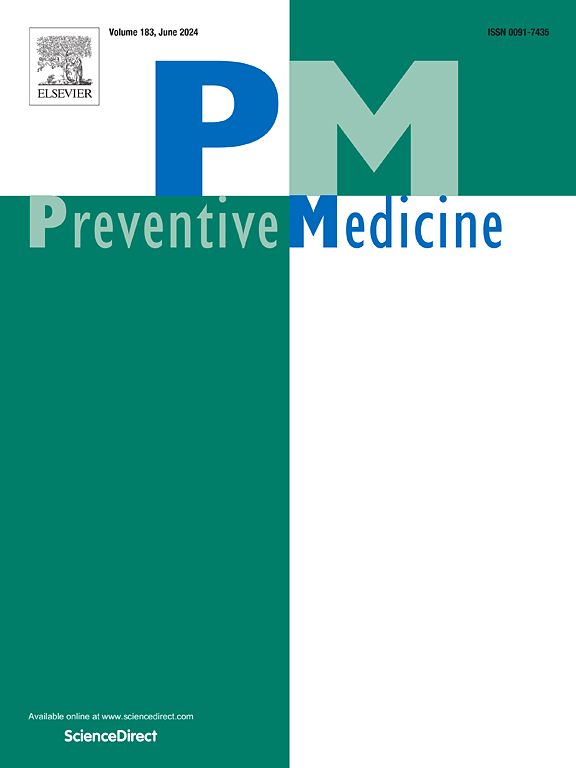The associations of long working hours and unhealthy diet with cardiometabolic outcomes and mortality in US workers
IF 3.2
2区 医学
Q1 MEDICINE, GENERAL & INTERNAL
引用次数: 0
Abstract
Objectives
To examine independent and joint associations of long working hours (LWH) and EAT-Lancet diet with cardiometabolic outcomes and mortality in US workers.
Methods
This prospective cohort included US workers from the National Health and Nutrition Examination Survey, with cross-sectional baseline data from 1999 to March 2020. A subsample of participants from 1999 to 2018 was linked to the National Death Index, with mortality follow-up through December 2019. The independent and joint associations of LWH (≥ 55 vs. < 55 h/week) and EAT-Lancet diet scores (low vs. high) with cardiometabolic outcomes and mortality were estimated using multivariable logistic and Cox proportional hazards models, respectively.
Results
LWH was associated with higher odds of obesity (OR = 1.20; 95%CI = 1.07, 1.34) among all workers and higher CVD mortality among workers with high CVD risk at baseline (HR = 1.64, 95%CI = 0.79, 3.12). Low diet scores were associated with higher odds of obesity (OR = 1.34, 95%CI = 1.21, 1.42) and diabetes (OR = 1.33, 95%CI = 1.01, 1.76) among all workers. Working hours and diet scores were jointly associated with obesity and CVD mortality, indicating by the relative excess risk due to interaction greater than zero among all workers.
Conclusions
LWH and unhealthy diet are independent risk factors and may interact to exacerbate adverse cardiometabolic health outcomes.
美国工人长时间工作和不健康饮食对心脏代谢结果和死亡率的影响
目的:研究长时间工作(LWH)和EAT-Lancet饮食对美国工人心脏代谢结果和死亡率的独立和联合关联。方法:该前瞻性队列包括来自国家健康与营养检查调查的美国工人,具有1999年至2020年3月的横断面基线数据。1999年至2018年的参与者子样本与国家死亡指数相关,并在2019年12月之前进行死亡率随访。LWH(≥55 vs < 55 h/week)和EAT-Lancet饮食评分(低vs高)与心脏代谢结局和死亡率的独立和联合关联分别使用多变量logistic和Cox比例风险模型进行评估。结果:低肝功能与较高的肥胖几率相关(OR = 1.20;95 %CI = 1.07,1.34),基线时心血管疾病风险高的工人心血管疾病死亡率更高(HR = 1.64,95 %CI = 0.79,3.12)。饮食低分数与更高的肥胖的几率(或 = 1.34,95 CI % = 1.21,1.42)和糖尿病(或 = 1.33,95 CI % = 1.01,1.76)在所有工人。工作时间和饮食评分与肥胖和心血管疾病死亡率共同相关,表明在所有工人中,由于相互作用造成的相对超额风险大于零。结论:低wh和不健康饮食是独立的危险因素,并可能相互作用加剧不良的心脏代谢健康结局。
本文章由计算机程序翻译,如有差异,请以英文原文为准。
求助全文
约1分钟内获得全文
求助全文
来源期刊

Preventive medicine
医学-公共卫生、环境卫生与职业卫生
CiteScore
7.70
自引率
3.90%
发文量
0
审稿时长
42 days
期刊介绍:
Founded in 1972 by Ernst Wynder, Preventive Medicine is an international scholarly journal that provides prompt publication of original articles on the science and practice of disease prevention, health promotion, and public health policymaking. Preventive Medicine aims to reward innovation. It will favor insightful observational studies, thoughtful explorations of health data, unsuspected new angles for existing hypotheses, robust randomized controlled trials, and impartial systematic reviews. Preventive Medicine''s ultimate goal is to publish research that will have an impact on the work of practitioners of disease prevention and health promotion, as well as of related disciplines.
 求助内容:
求助内容: 应助结果提醒方式:
应助结果提醒方式:


